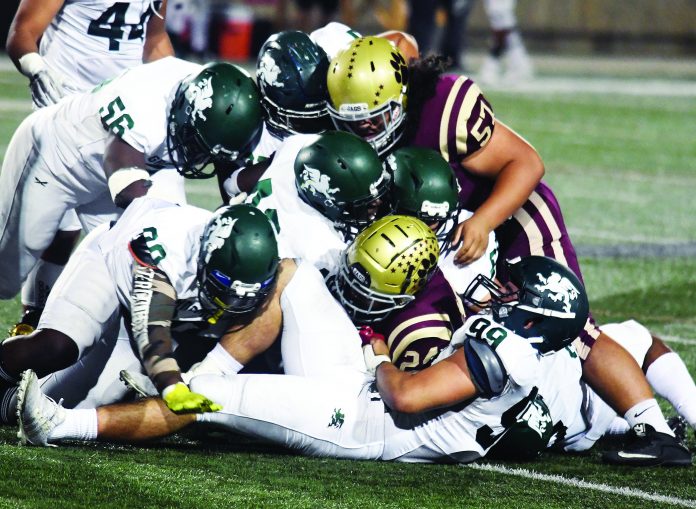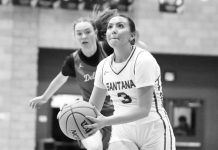
The California Community College Athletic Association had initially set a July 17 deadline to determine the status of the upcoming 2020-21 intercollegiate sports calendar amid the COVID-19 (coronavirus) pandemic.
However, due to the worsening situation within the state due to an increase in the infection rate, the board of directors issued a statement on July 9 announcing it had selected its contingency plan to proceed with for the upcoming season.
As a result, there will be no sports competition across state community college campuses this fall. Instead, JC athletes will have to wait to the spring semester to don gear and head to the practice fields.
Football, water polo, soccer, cross country, women’s volleyball and basketball teams will be the first sports affected at Southwestern College as they move from a fall to a spring format.
Practices will start in mid-January and games will start in early February, ending with playoffs in April.
“Crazy times,” Southwestern College football head coach Ed Carberry said. “I believe delaying play until spring is the smart decision. Takes it off the players and coaches.”
Three plans were under consideration ahead of the planned July 17 decision date.
The conventional plan, the most ambitious of the three plans, would have kept sports as they were in their traditional time frame and was the best-case scenario if health conditions permitted.
A second plan would have moved non-contact sports to the fall semester and contact sports to the spring semester. Swimming and diving and cross country would have been highlighted in the fall under this plan.
The contingency plan was the most stringent and moved all fall sports to the spring.
Board chair Dr. Erika Endrijonas, president of Pasadena City College, said each plan was wholly dependent on which phase of reopening from the COVID-19 pandemic the state of California was in ahead of the July 17 decision date. It was reliant on California being in Phase 4 of its reopening by mid-July, a likelihood that diminished in recent weeks and which prompted the board’s earlier than expected decision.
Health and safety issues remain a concern.
Endrijonas said the return to athletics in January will only occur if it is safe to do so, a decision that will be guided primarily by state and local health guidelines.
“I know I speak for the entire CCCAA board that moving fall athletics to spring 2021 is a huge disappointment,” Endrijonas said. “However, the need to keep our student-athletes and the amazing coaches and athletic trainers who work with them safe was simply the only option available with the virus spiraling out of control across the state.”
The contingency plan originally had men’s and women’s cross country and women’s golf competing in the fall but was slightly modified in its latest version to move those sports to the spring with the remainder of the CCCAA’s 24 sports.
They will start practice in mid-January and begin competition in February along with basketball, football, soccer, women’s volleyball, water polo and wrestling.
Badminton, baseball, beach volleyball, men’s golf, softball, swimming and diving, tennis, track and field, and men’s volleyball are scheduled to start practice in late March before commencing competition on April 10.
All sports will have a 30 percent reduction in the maximum number of contests or competition dates that they are currently permitted and will also have one week of regional postseason competition.
The CCCAA will not have state championships in 2020-21.
“We were very hopeful that we could go forth with the conventional plan,” Interim Executive Director Jennifer Cardone said. “It’s the closest to what everyone is used to and provides for the least disruption to our student-athletes and colleges.
“Unfortunately, California’s reopening progress has slowed, and it’s become apparent that we would not be in position to put it into action on July 17.
“The health and safety of our student-athletes, coaches and staffs are our top priorities. While the contingency plan has the most drastic changes, it’s also the one that provides us the best opportunity to return to competition.”
Spring fling
Under all three plans, basketball was slated to become a spring sport and move from its traditional November through March time frame. The new season will run from February through April and include a maximum of 20 regular season games and two scrimmages as opposed to 28 regular season games and two scrimmages.
Schedules will be condensed with the need to share campus facilities. For instance, women’s volleyball and basketball would share the same time frame as would soccer and football.
Along with schedule shifts, funding shortfalls may also impact athletic departments, meaning that colleges may not be able to field all sports in a given season.
Pigskin parade
Grossmont finished the 2019 community college football season with a 1-9 record, defeating division rival Orange Coast College, 27-18, for its lone win of the season.
Several Griffins received all-conference recognition, including freshman offensive lineman Mason Tileia (Granite Hills) on first team offense, sophomore receiver Mylik Steen (Castle Park) and sophomore running back Jarius Burnette on second team offense and freshman inside linebacker Dayne Fehoko (Olympian), sophomore outside linebacker Anthony Sola (Morse), sophomore safety Derek Sutherland and freshman punter Jack Browning (West Hills) on second team defense.
Burnette rushed for 400 yards and scored three touchdowns during the season while accumulating a team-leading 871 all-purpose years. Steen caught 35 passes for 548 yards and three touchdowns while racking up 640 all-purpose yards, second-best on the team.
Sutherland ranked third on the team with 49 tackles while recording 2.5 tackles for a loss, one fumble recovery, two interceptions and three pass breakups.
Fehoko recorded 41 tackles, 2.5 tackles for a loss and one fumble recovery while Sola recorded 36 tackles, 4.5 sacks, six tackles for a loss and one fumble recovery.
Browning, who led the Griffins in scoring with 26 points on four field goals and 14 extra-point conversions, averaged 38.2 yards on 60 punts with 14 kicks landing inside the opponent’s 20-yard line.
Defensively, sophomore Anthony Jordan topped the Griffins with 66 tackles while Robert Whitehead (Steele Canyon) led the team with three interceptions.
Sophomores Joaquin Quintana-McKinney (601 passing yards, four touchdown passes) and Sharif Harris-Legree (582 passing yards, three touchdowns) led the Griffins offensively at the quarterback position in 2019.
Quintana-McKinney prepped at Serra High School.
Southwestern College head coach Ed Carberry said the move to the spring allows players to brush up on their studies and get their academic standing in order. It would also allow players additional time to spend time in the weight room to get stronger.
“We’re going to keep lifting and come out of this ready to go,” Carberry said with a determined voice.
PRESEASON POLL
The San Diego State University Aztecs have been picked to win the West Division of the Mountain West Conference in a preseason vote by media representatives, the league announced on July 21.
The Aztecs received 19 of 21 first-place votes and 122 points overall — 22 points ahead of runner-up Nevada-Reno. SDSU has been picked to finish either first or second in the West Division all eight years of division play.













